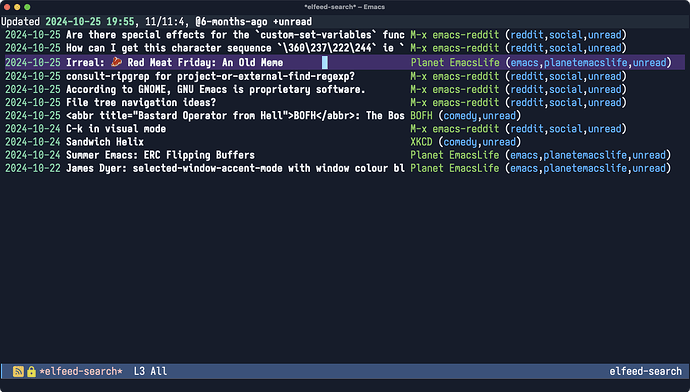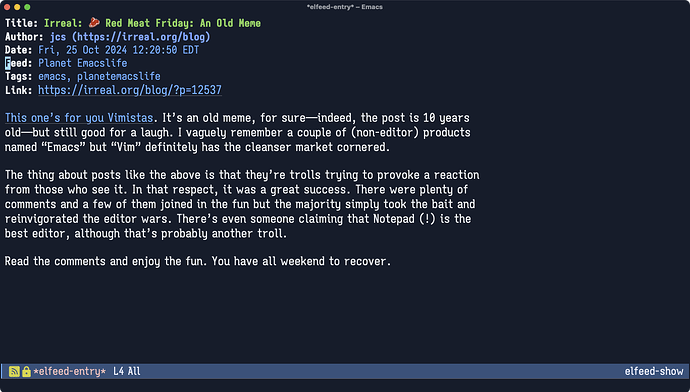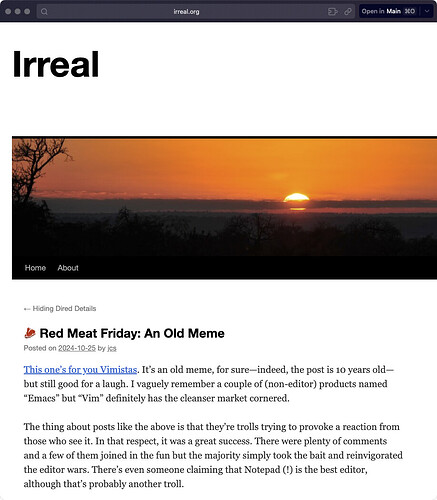Just curious, does anyone use an RSS reader to read Web information and, is so, which one? I haven’t used one for many, many years but read a piece by Cory Doctorow on the advantages of RSS for getting rids of ads and junk and basically focusing on whatever it is you’re interested in on the Web.
I use a news reader everyday. The one I use is NetNews Wire. I like its combination of simplicity and robustness. Everything is local, and not connected to a reading service.
Of course, there are many, and I hope there is a long list of options published here.
I’m a big user of RSS. For many of the reasons Cory mentioned and more, it has been my primary interface to information on the Web for many years (since before Google Reader came and went).
I mostly use Feeder on my GrapheneOS phone, but I don’t think it’s available for iOS. (Confusingly, there’s also an online RSS aggregator called Feeder that I don’t think is related.) Thunderbird, in addition to being an email client, has a serviceable RSS reader in the cross-platform desktop app. One of my criteria was that I wanted a reader that didn’t require a subscription or account on a centralized server. That enhances privacy, but I suspect most folks would gladly give up a little privacy for the convenience of having their RSS reader synchronized between devices.
It can get confusing because you can have an online feed aggregator that interfaces with apps, or you can have standalone apps like Feeder, or you can use an online aggregator that you interface with directly on the Web. Think of it like using gmail – you can access gmail through Apple Mail or other mail clients, or directly on the Web. The online aggregators cost a few dollars a month.
You can also get RSS feeds sent to you as email, as Adam discussed in this timely article:
Like @jtcummins, I have also used and liked NetNewsWire.
I use NetNewsWire on my Mac and Reeder Classic on my iPhone. I’ve been using RSS for decades at this point, and my usage is fairly simple – a long list of feeds that I browse individually depending on what I’m in the mood for at any particular time.
Both my readers can be used without an account or server, but syncing is absolutely necessary for me, otherwise reading feeds on two or more devices would be totally unmanageable. For reasons I can’t now remember, I decided to self host using the free FreshRSS. This is a way of addressing @ron’s privacy concerns and still having the benefits of syncing (and a serviceable, if inelegant web interface). FreshRSS is fairly easy to install on any standard Linux web host.
I use ReadKit on the Mac and Reeder on iOS. I used NetNewsWire religiously and then it went through changing ownership and general neglect. By the time it came back, my workflows were pretty set.
I used Feedbin as a syncing service. I don’t mind paying a monthly subscription for that, as it’s reliable and speedy.
I prefer to use a web-based RSS reader. This is due to my personal requirements:
- Collect feed data in the background, without needing to keep the app running all the time.
- Access the feeds from multiple computers, such that when I read an article on one, it is marked read on all of them.
To that extent, I use Feedly. I use the free tier, which meets my requirements. There are additional features (that I don’t care about) available with a paid subscription.
I’ve seen that one mentioned and was considering it. There was also NetNewsWire, which got decent recommendations, and a lot of folks seem to like Vienna. Thanks all for the info.
I used Safari RSS, Firefox Live Bookmarks, and Google Reader, but when they were all discontinued I switched to Feedly, with the Feedly Notifier extension in Firefox.
The reason is that I really want the RSS feed to be in a web browser. I want to click on links in the posts and have them open web pages. So I don’t want a separate application.
That’s why I use NetNewsWire. It opens a browser view within itself, so I’m not cluttering up my Safari tabs with short-term articles. (I can force a link to open in Safari if I want, but it’s not the default behavior.)
It’s free and uses iCloud to sync your RSS between your devices. I switched to NetNewsWire after my paid RSS feed service shut down. My previous RSS readers all required paying for an RSS feed, which I was loathe to do after getting burned. I’d also been frustrated because my favorite iPhone reader stopped being updated and wouldn’t run so I had to use different readers on different devices. Now I just use NetNewsWire everywhere and it’s quite nice.
ReadKit can be set up to do exactly that.
I use a hybrid approach:
I collect my feeds using a cloud-based aggregator, The Old Reader, for the same reasons that @Shamino cited for using Feedly. The Old Reader has a 100-feed free tier that probably will be sufficient for many people, but I found a paid subscription to be a better fit for me. Premium plans start at $25/year for 500 feeds.
While I usually access The Old Reader through a standard web browser, I’ve found Silvio Rizzi’s Reeder app to be very useful as a client for The Old Reader. Browsing quickly through a lot of feeds, especially graphics-rich feeds, seems more efficient with a dedicated client app.
I’ve been using an RSS reader for years, it’s imo the best way to follow interesting blogs I found over the years. I don’t want to rely on Reddit, HackerNews, and other forums to surface new articles of great blogs.
I found a great RSS reader, called Lighthouse, which lets me filter articles before putting them in the library. Makes it easy to remove articles I’m not interested in.
I use Lire. The developer has been great, and the app serves me well. I’m not on social media, so RSS has been (for years) a great way for me to choose what I want and keep me as informed as I want.
I use DevonTHINK’s RSS reader function. Primarily as a route to snipping information into my various databases.
NetNewsWire is free and a rather well done RSS / Atom Reader. I used it for many years. It is what I would recommend to any Apple Mac or mobile device user.
However, I have recently transitioned my feed reading to Emacs using Elfeed. I was able to export feeds using OPML and import into Elfeed.
I know what you are thinking, why Emacs?
NeXTStep → OpenStep → macOS have Emacs keybindings built-in as the developers at NeXT used Emacs all the time. They likely used it while building their state of the art OS and the Developer API’s.
It’s much more than a mere editor. It is a mutable state machine. Meaning you can change the state at runtime overriding just about anything and alter the way things work. It is the most customizable software I’ve ever encountered.
Elfeed Main Feed Listing
Assigned a keybinding (C-c e) to open Elfeed
(R) marks read (U) unread (B) opens a browser.
You can filter the view (S) to set the filter and (C) to reset the filter to the default and the filter is shown at the top. You can simply create custom filters and bookmark them. Go to the bookmark and it opens the filtered view of feeds. You can bookmark most everything in Emacs. You can even bookmark a sophisticated SSH connection with an SSH jump server and even allow sudo. That way you don’t have to type the long entry to connect every time.
Reading an article
Pressing (B) opens in Little Arc browser
If the content in the RSS/Atom feed is complete and not just a short summary or a URL you can read it by pressing Return as shown in the screenshot above. If the article is one that is just a URL, pressing B pops open the browser to read the article. You can also click with the mouse on the articles URL to open the browser.
Arc is nice for this Little Arc browser feature. Clicking URL’s outside of Arc opens the Little Arc window instead of the main browser window. Which is nice because I usually have a ton of websites open in the main Arc window.
I’m also a Reeder (Classic) user for my RSS followings, primarily on iOS and iPad, only occasionally on the Mac. Have been for years now. Before that I used the also excellent NewsExplorer, but I can’t remember why I switched, I also was happy with that one. Must have been details.
In Reeder, I like the simplicity and that it syncs seamlessly between iPhone and iPad.
Like David, I use Feedly. I switched to it when Google Reader shut down. At one point in the early days they offered a lifetime subscription for a pretty modest sum, so I paid for that. It suits my needs, and the iOS app works well on my iPad and phone.
I’ve been using NetNewsWire for about 20 years, going back to when I was on the IETF group designing the Atom newsfeed format. It is a great reader.
I currently use it on Mac, iPad, and iPhone, all kept in sync in the background with iCloud.
As @IzvorMusic, news junkie going on years with lire, which keeps getting better. Its trademark (but now quite common) feature is the full-text parsing of truncated articles referenced in feeds. It’s also got integrations with all the important aggregators, including the self-hostable ones like FreshRSS and Miniflux. And if you’re all Apple, all the time, there’s iCloud, including a rather nice option to make your Mac a “server” that fetches articles and stores them in iCloud so your iOS devices can pick the articles up without having to fetch them directly, relying on Apple’s synchronisation. Really great stuff.
And of course I got to this topic through RSS, and am writing this now on iOS in the embedded web view in lire. Highly recommend. RSS is the only safe haven left.
No one has mentioned leaf and that is what I use. I’ve used it since Google Reader died and replaced my twitter news feeds when it died and I like it.


